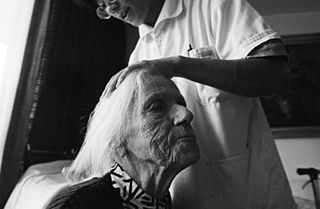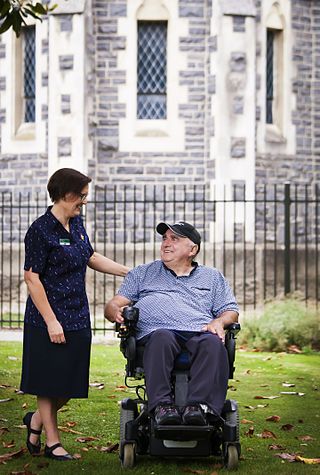Related Research Articles

Home care is supportive care provided in the home. Care may be provided by licensed healthcare professionals who provide medical treatment needs or by professional caregivers who provide daily assistance to ensure the activities of daily living (ADLs) are met. In-home medical care is often and more accurately referred to as home health care or formal care. Home health care is different non-medical care, custodial care, or private-duty care which refers to assistance and services provided by persons who are not nurses, doctors, or other licensed medical personnel. For patients recovering from surgery or illness, home care may include rehabilitative therapies. For terminally ill patients, home care may include hospice care.
Palliative care is an interdisciplinary medical caregiving approach aimed at optimizing quality of life and mitigating suffering among people with serious, complex, and often terminal illnesses. Within the published literature, many definitions of palliative care exist. The World Health Organization (WHO) describes palliative care as "an approach that improves the quality of life of patients and their families facing the problems associated with life-threatening illness, through the prevention and relief of suffering by means of early identification and impeccable assessment and treatment of pain and other problems, physical, psychosocial, and spiritual". In the past, palliative care was a disease specific approach, but today the WHO takes a broader patient-centered approach that suggests that the principles of palliative care should be applied as early as possible to any chronic and ultimately fatal illness. This shift was important because if a disease-oriented approach is followed, the needs and preferences of the patient are not fully met and aspects of care, such as pain, quality of life, and social support, as well as spiritual and emotional needs, fail to be addressed. Rather, a patient-centered model prioritizes relief of suffering and tailors care to increase the quality of life for terminally ill patients.
Terminal illness or end-stage disease is a disease that cannot be cured or adequately treated and is expected to result in the death of the patient. This term is more commonly used for progressive diseases such as cancer, dementia or advanced heart disease than for injury. In popular use, it indicates a disease that will progress until death with near absolute certainty, regardless of treatment. A patient who has such an illness may be referred to as a terminal patient, terminally ill or simply as being terminal. There is no standardized life expectancy for a patient to be considered terminal, although it is generally months or less. Life expectancy for terminal patients is a rough estimate given by the physician based on previous data and does not always reflect true longevity. An illness which is lifelong but not fatal is a chronic condition.

Royal Trinity Hospice is the oldest hospice in the United Kingdom; it was founded in 1891 by a member of the Hoare banking family. It is located in Clapham Common, London, England, and provides specialist palliative care. In 2019, Royal Trinity Hospice was rated "Outstanding" by the Care Quality Commission, the highest rating that can be awarded. The hospice provides palliative and end of life care for patients in an inpatient unit at their Clapham Common headquarters and in the community, wherever patients may be living. In 2018, Trinity cared for 2,500 patients; in addition, the hospice provided pre- and post-bereavement support for over 900 carers.
Residential care refers to long-term care given to adults or children who stay in a residential setting rather than in their own home or family home.
Home health is a nursing specialty in which nurses provide multidimensional home care to patients of all ages. Home health care is a cost efficient way to deliver quality care in the convenience of the client's home. Home health nurses create care plans to achieve goals based on the client's diagnosis. These plans can include preventive, therapeutic, and rehabilitative actions. Home health nurses also supervise certified nursing assistants. The professional nursing organization for home health nurses is the Home Healthcare Nurses Association (HHNA). Home health care is intended for clients that are well enough to be discharged home, but still require skilled nursing personnel to assess, initiate and oversee nursing interventions.

A caregiver, carer or support worker is a paid or unpaid person who helps an individual with activities of daily living. Caregivers who are members of a care recipient's family or social network, and who may have no specific professional training, are often described as informal caregivers. Caregivers most commonly assist with impairments related to old age, disability, a disease, or a mental disorder.
Rainbow Hospice and Palliative Care, founded in 1981, is one of the oldest and largest non-profit hospice and palliative care providers in Illinois.

In the United States, hospice care is a type and philosophy of end-of-life care which focuses on the palliation of a terminally ill patient's symptoms. These symptoms can be physical, emotional, spiritual or social in nature. The concept of hospice as a place to treat the incurably ill has been evolving since the 11th century. Hospice care was introduced to the United States in the 1970s in response to the work of Cicely Saunders in the United Kingdom. This part of health care has expanded as people face a variety of issues with terminal illness. In the United States, it is distinguished by extensive use of volunteers and a greater emphasis on the patient's psychological needs in coming to terms with dying.
Hospice care is a type of health care that focuses on the palliation of a terminally ill patient's pain and symptoms and attending to their emotional and spiritual needs at the end of life. Hospice care prioritizes comfort and quality of life by reducing pain and suffering. Hospice care provides an alternative to therapies focused on life-prolonging measures that may be arduous, likely to cause more symptoms, or are not aligned with a person's goals.
Sharp Grossmont Hospital is located in La Mesa, California, United States. It is the largest healthcare facility in East San Diego County with a service area covering 750 square miles. The property is owned by Grossmont Healthcare District, which has leased it to Sharp HealthCare since 1991. Sharp HealthCare, however, manages all hospital operations as a separate entity.

Father Eugeniusz Dutkiewicz SAC Hospice in Gdańsk is a charitable organisation that was founded by the Pallottine priest E. Dutkiewicz in 1983, which provides palliative care for the terminally ill.
An informal or primary caregiver is an individual in a cancer patient's life that provides unpaid assistance and cancer-related care. Due to the typically late onset of cancer, caregivers are often the spouses and/or children of patients, but may also be parents, other family members, or close friends. Informal caregivers are a major form of support for the cancer patient because they provide most care outside of the hospital environment. This support includes:
Coastal Hospice and Palliative Care is a non-profit health care organization founded in 1980. It is located in Salisbury, Maryland, and serves Dorchester, Wicomico, Somerset and Worcester counties.
In 2006, hospice and palliative medicine was officially recognized by the American Board of Medical Specialties, and is co-sponsored by the American Boards of
Pediatric Home Service is an independent home health care provider. PHS provides in-home care to medically-complex children in Minnesota and is certified by The Joint Commission. PHS offers in-home pediatric health care services.
Assisi Hospice is a hospice in Singapore which provides palliative care to terminally ill patients.
The Society for the Promotion of Hospice Care (SPHC) is a non-profit NGO that advocates and provides hospice and palliative care services in Hong Kong, China. It also conducts end-of-life research, education, and training.
Carondelet Health Network is a large Catholic health care provider based in Tucson, Arizona. It has five facilities: Carondelet St. Mary's Hospital, Carondelet St. Joseph's Hospital, Carondelet Neurological Institute, Carondelet Heart & Vascular Institute, and Carondelet Holy Cross Hospital in Nogales, Arizona.
Margaret Ruth McCorkle FAAN, FAPOS was an American nurse, oncology researcher, and educator. She was the Florence Schorske Wald Professor of Nursing at the Yale School of Nursing.
References
- ↑ "Full Circle Cinema".
- ↑ "Hospice Savannah". Archived from the original on 2009-02-07. Retrieved 2009-02-09.
- ↑ "Hospice Savannah's Butterfly Team honored with award | savannahnow.com". Archived from the original on 2012-07-15. Retrieved 2009-02-09.
- ↑ "Hospice Savannah". Archived from the original on 2009-02-08. Retrieved 2009-02-09.
- ↑ "A time to grieve, remember, share | savannahnow.com". savannahnow.com. Archived from the original on 23 July 2012. Retrieved 2 February 2022.